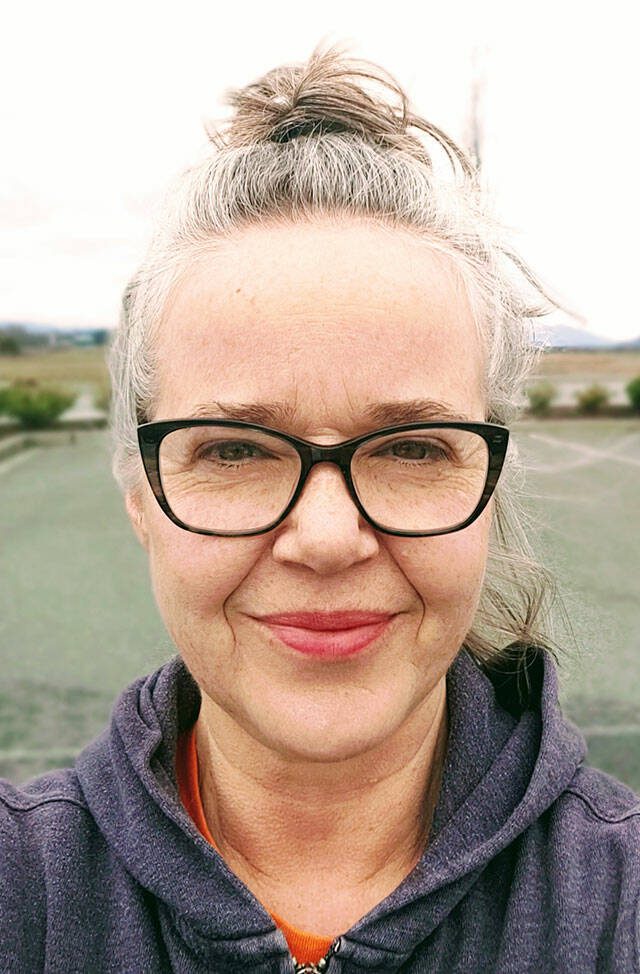By Edie Everette / Herald Forum
This summer a new restaurant opened in my small town and at the soft opening I dined on crispy chicken that lay like a courtesan on a bed of aromatic lavender rice. A group of local boys and girls mow lawns around the restaurant, the girls with pink purses and the boys wearing newsboy caps. Altogether, walking to and fro across the grass, they resemble a painting by the late custodian-artist Henry Darger.
For some it is already hot enough to swim. I wait all year for the river to warm because when I float and get carried along on my back by the current it feels exactly like “letting go and letting God.” Tourists swim too, a group whose arrival each year can make the town folk feel both annoyed and gracious.
More and more households here are purchasing golf carts, which they decorate with garlands and flowers. This town’s partying crowd straps a stereo to the front of their cart, causing music to fade into then out of our lives. This group drinks and laughs loudly; they draw with chalk on the streets and in the fall carve rows of pumpkins that glow along the riff-raff. I watch the partiers from afar and never join, only marvel at how carefree they are able to be in adulthood.
I so miss being carefree.
I am writing at a TV tray at the little store that I own in town, a Smooth Jazz Piano station playing on Spotify. So many songs come up that remind me of my mother: Rogers and Hart’s “My Funny Valentine,” George and Ira Gershwin’s “They Can’t Take That Away from Me.” When I was a child, my mother drank Manhattans, leaned on our neighbor’s stereo cabinet that was the size of a coffin, and sang show tunes and classics in a voice so emotive that I felt abandoned. I had no idea who this sexy, wailing woman was; who, hours before, had been my demur mother.
Because we are surrounded by mountains, two sunsets a night may occur when the sun slides behind the largest mountain then appears on the other side before setting for good. In the middle of summer, I imagine the steep, green mountain fields as those of Austria where, in 1938, the Von Trapp Family singers climbed to escape German-occupied Europe. Surrounding our town, thousands of evergreen trees, like cathedrals or arrowheads, gesture for me to look upward, to keep my chin up.
This summer the air is alive with monarch butterflies. Other names for these iconic pollinators are common tiger, milkweed, black-veined brown and wanderer. I haven’t seen one caterpillar all year, yet the monarchs showed up en masse. Do you know what I haven’t seen in forever? Huge tent caterpillar nests in the trees. As a child, I remember them being all over and up high; masses of gauzy webs peppered with eggs and larva. Men with torches would light the nests and fires burned in the branches.
Outside my store window, a dog named Hero lies under a mountain ash tree while the young mowers picnic. My legs shake. They always have. I drink too much coffee. In her book, “If You Want to Write,” Brenda Ueland cautions against coffee, tobacco, drugs and alcohol because they encourage “mental evacuation” — spewing — and shut off the conscience, which is the true inner critic we need to pay attention to in order not write obscure drivel.
Raspberries are ripening. These sweet, seedy fruits are stolen off of my niece’s vines by both me and my dog Kenny who carefully picks them with his teeth. In 1990 I watched a film called “An Angel at My Table,” directed by Jane Campion and based on the life of New Zealand author Janet Frame. At the end of the film — after having been in a mental institution and nearly lobotomized but saved by the fact that her novel got published — Janet Frame’s character is living behind her sister’s house in a trailer typing away and writing books. I said to myself, I want to do that!
And here I am, living across the alley from my niece’s family in a manufactured home, writing.
Edie Everette is a writer and news junkie who lives in Index.
Talk to us
> Give us your news tips.
> Send us a letter to the editor.
> More Herald contact information.

























